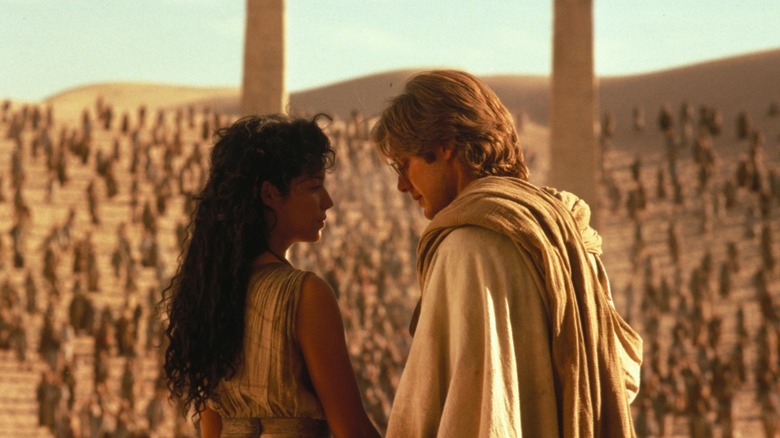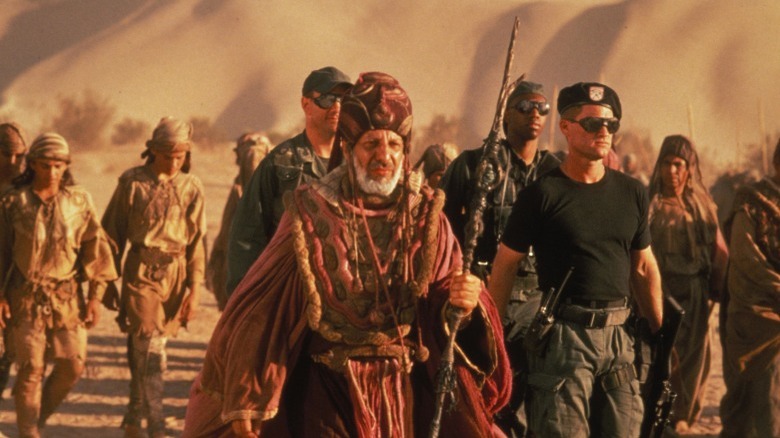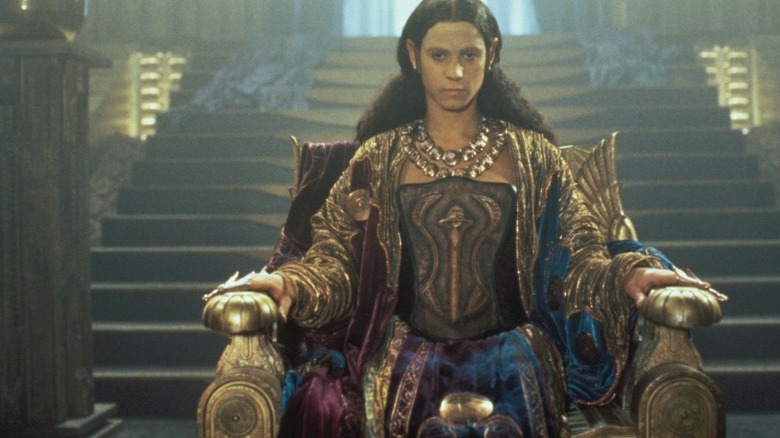Stargate's Production Went The Extra Mile With Recreating Ancient Egypt
Before his bonkers space movie "Moonfall," Roland Emmerich made a tongue-in-cheek sci-fi flick named "Stargate," whose plot centered around extraterrestrials laying the foundation for human civilization. When "Stargate" hit theaters in 1994, critics tore Emmerich's sci-fi adventure film to shreds, criticizing it for its consistently corny tone and underbaked storyline. On the box-office front, "Stargate" performed considerably well, and went on to become Emmerich's breakthrough film, which eventually led to the culturally relevant, well-received "Independence Day." Despite the film's inconsistent track record, "Stargate" still holds up as a curious, enjoyable entry in Emmerich's filmography, as several aspects of the film stand out, corniness notwithstanding.
The film opens with an extremely cliché excavation montage and transitions to linguist and Egyptologist Daniel Jackson (James Spader) being offered a job to translate hieroglyphics on cover stones unearthed in Giza. While Daniel is able to solve the puzzle moments after his involvement in the top-secret project, he soon learns that the U.S. Air Force will be the one pulling the strings in this operation. Enter Colonel Jack O'Neill (Kurt Russell), whose blunt demeanor is in direct contrast with Daniel's frank, warm personality. After the titular stargate is activated, the group is transported to a desert planet that might or might not be brimming with extraterrestrial life. Unfortunately, they seem to have no way of returning home.
The topography of the desert planet Abydos was deliberately designed to evoke ancient Egypt, replete with pyramid-like structures and monoliths etched with hieroglyphics. Emmerich and producer/co-writer Dean Devlin were successful in creating a convincing world that seemed removed from space and time, inhabited by people who speak a variant of ancient Egyptian dialects known to man. Here's how the "Stargate" team managed to pull this off.
A commitment to authenticity (and sci-fi fans)
In a Variety interview commemorating the 25th anniversary of the film, Emmerich and Devlin explained that the core idea of "Stargate" emerged from the theory that alien civilizations were instrumental in helping humans advance as a race. Using this as a cornerstone for their story, the duo "came up with the idea that they're [the characters] going through a gate," which functions as a portal to an alien planet. After the journey is made in the film, Daniel realizes that the symbols necessary for their way back to Earth are missing, which prompts the military group to venture deeper inside the desert, where they discover a human settlement controlled by an alien overlord named Ra (Jaye Davidson).
As the humans on Abydos spoke a variant of ancient Egyptian (which Daniel spends a considerable time deciphering in the film), Devlin and co. wanted to construct an authentic linguistic system to "recreate our best guess of what ancient Egyptian sounded like." As this ancient Egyptian dialect functioned more as an estimation than an actual, recorded language, the decision to hire an Egyptologist from UCLA for the task was testimony to Emmerich and Devlin's commitment to capturing authenticity. Devlin also explained that they went the extra mile for the sake of hardcore sci-fi fans:
"And we went through pains to teach the actors to recreate the language...Our executive producer at the time was screaming at us saying, 'Why are you spending all this money and time creating a language that not a single person on Earth will know whether it's accurate or not?' I kept saying, the sci-fi fans will know."
While these efforts were not enough to remedy the film's inconsistent script and dialogue, they helped add an aura of sincerity to the central premise.
Why Stargate is a fun, corny-as-hell adventure in space
For starters, David Arnold's score for "Stargate" is nothing short of phenomenal, as it succeeds in elevating several scenes with its operatic, otherworldly quality. Apart from this, "Stargate" boasts a thoroughly enjoyable, curt-as-heck Kurt Russell, who steals almost every scene he is in despite having to work with an extremely clunky script. There are some badass action sequences in which Russell's O'Neill kicks the butts of Ra's henchmen and at a particular point, he says "Give my regards to King Tut, a**h***" to a dude before sending him flying. Nothing in the course of this 2-hour-long sci-fi genre mash is meant to be taken too seriously, and this sense of levity greatly elevates the viewing experience, in my opinion.
The beating heart of "Stargate," however, is Davidson's Ra, whose presence alone injects the narrative with the telltale excitement traditionally associated with alien-centric mysteries. Ra, who is actually an alien disguised as the Egyptian sun god, emerges as an interesting antagonist who threatens to destroy Earth at the slightest provocation. Davidson's performance, coupled with the uncanny nature of his robot-like voice and glowing eyes, adds an appropriate amount of menace to the core climax towards the end. Also, Ra's lavish fits and Pharaoh-like Egyptian masks are a mood.
No, there is nothing else that stands out in "Stargate," unfortunately. A deeply flawed, mediocre flick about alien overlords and an excessively wholesome linguist, "Stargate" is nothing more than a fun, one-time watch. However, if you want to see beefed-up Kurt Russell beating armored humanoids up while yelling expletives, this is the film for you.


